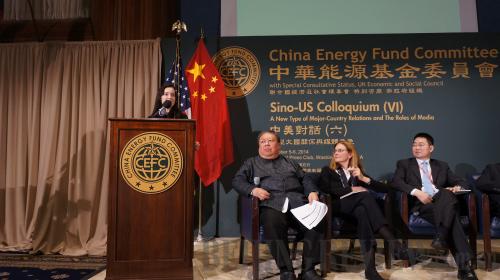|
 |
|
A two-day forum entitled A New Type of Major Country Relations and the Roles of Media was held in Washington D.C. on October 5-6. Corrie Dosh, a columnist for Beijing Review addresses a group of Chinese and American media insiders (SHEN ANQI) |
Last week I had the pleasure of joining colleagues from China and the U.S. to discuss the role the media plays in the future of our two great countries at the sixth annual Sino-U.S. Colloquium in Washington, D.C.
There's no doubt that our industry is at a crossroads. U.S. newspapers and magazines are shrinking their operations—closing bureaus, reducing headcount, and trimming any fat as profit margins shrink. Chinese news outlets are expanding their presence overseas, as evidenced by our own New York-based bureau. In this new era of shifting profit models, we are also attempting to navigate the convergence of new media – blogs, twitter, Facebook and YouTube – with our brick-and-mortar brands.
Any momentous paradigm shift can be difficult, but the possibilities that new media bring are exciting. Journalism is now more about helping readers connect with each other, moderating a thoughtful discussion, and creating space for new ideas to flourish. Media are a bridge to span cultural, political and geographical divides.
It's quite an evolution. Just a half-century ago, when Beijing Review was launched, we ran articles such as "The U.S. Aggressors Have Put Nooses Round Their Own Necks" in 1958, warning readers that the Americans were poking their snake heads around the world and would sink deeper and deeper in isolation with the world against them. The same year, in the New York Times, we had articles like "Reds Maintaining Firm Grip in China" through a "grapevine of propaganda and intelligence."
It wasn't until the 1970s, after Nixon made his trip to China and the Joint Communiqué, that the press on both sides warmed up. A 1979 piece from Beijing Review's archives titled "First Impression of Americans: Growth of the Friendship Between Chinese and American People" said it was a great thing that the "abnormal" relations of the U.S. and China in the previous two decades had ended. And that the "golden bridge of friendship" had been rebuilt because Americans and Chinese thought and felt alike.
Now, Beijing Review is tweeting about American political races, posting pictures of Beautiful China on Facebook, and publishing videos on its YouTube channel. In these ways, we can bring our readers from around the world together. This would have been unthinkable fifty years ago. Our aim is now to facilitate opinions and discussion and to listen to our readers. Online forums and boards are where we, as journalists, can bring important issues to light and build consensus. Instead of publishing letters to the editor, we can publish a live, interactive discussion and participate directly with the reader.
So, for example, when Fox News host Bob Beckel made controversy last July when he said, "Chinamen are coming to the U.S. to learn how to do computers and then they go back to China and hack us" we published a post on Facebook that generated a discussion among our readers. We then used that to gauge our readers' interest in further coverage and to publish our own opinions on the comments.
And, during the 2012 election, we included live coverage of the presidential debates and election night through Twitter and Facebook and compiled it into a dedicated landing page on our website. There are so many ways readers can engage journalists now on hot topic. I think that's one of the biggest changes I've seen as a journalist with the rise of new media.
The relationship between the U.S. and China can never go back to what it was. We are now so connected. A generation of young global citizens is growing up, without the trappings of prejudice and paranoia. If journalists do their jobs right, we will be there as well – serving as the voice for the voiceless, the witness to history and the verifier of facts. It's a new era for Sino-U.S. relations, and a new era for media.
The author is a columnist for Beijing Review, living in New York City | 